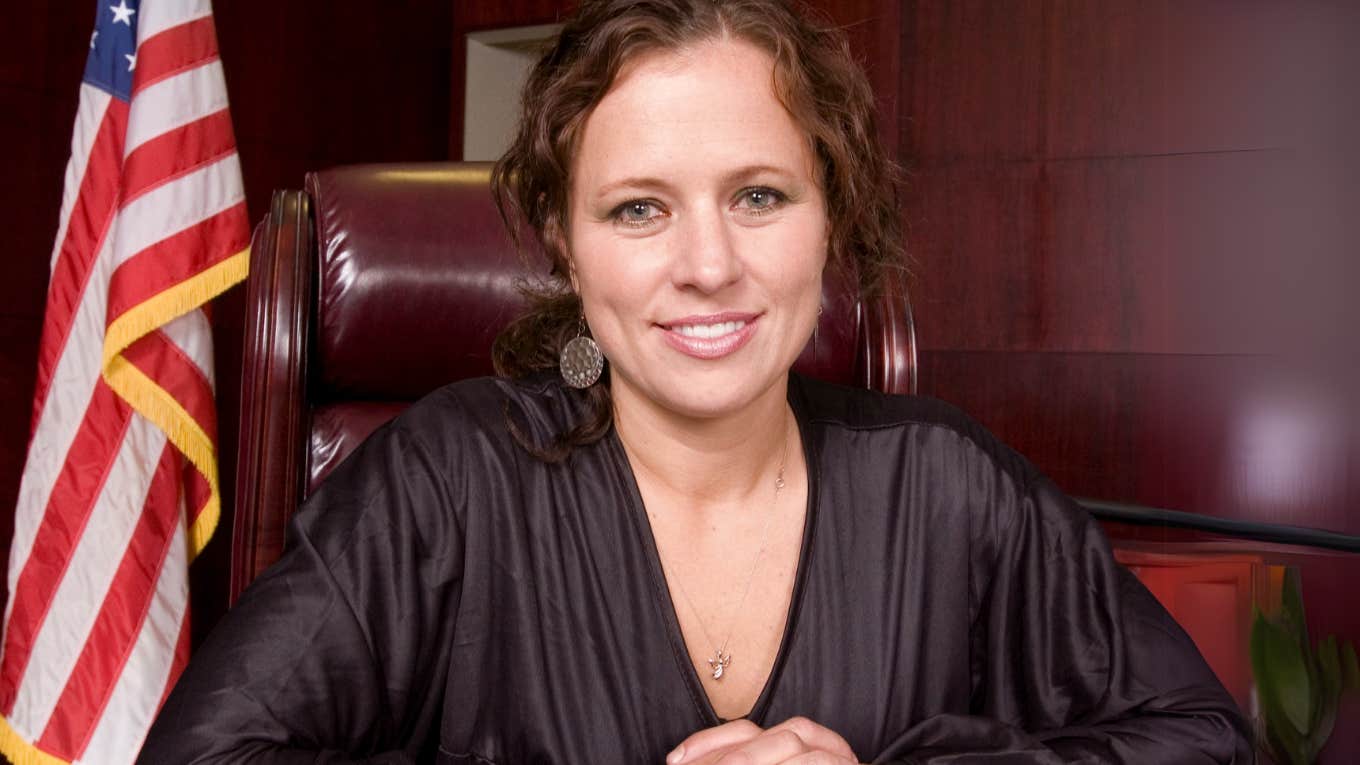I Channeled My Family’s Trauma Into A Mission To Fight For Abused Women
Embracing your authentic self is paramount.
 Renphoto | Canva
Renphoto | Canva From a very young age, I witnessed relentless abuse and bullying at the hands of my father towards my mother, brother, and myself. Despite being a very successful surgeon, he had a dark side. I learned the harsh realities of abuse firsthand and how it is often hidden. There was a critical moment between the ages of 14-15 wherein I had to become the shield to protect my brother. There was never any fault attributed to my mother; she was indeed a victim and was unable to stand up to her abuser. To this day, my mother is my hero; if I can be half the woman she has been, I will succeed in life.
My mother and father had gotten divorced. During one of the weekend visitations with my father, this particularly defining life moment occurred. My brother had refused to eat his brussels sprouts.
My father, in reaction to this, began physically assaulting my brother. I was 14, and my brother was 12 at this time. When he got the chance, my brother ran away as fast as he could. My father knew he would run to the only place he thought he would be safe, my mother's house, even though it was over three miles away. Enraged by my brothers running away, my father started his car, made me get in his car, and proceeded to chase my brother. My brother ran three miles to hide in the safety of my mother’s home.
Once my father arrived at my mother’s home, I learned very clearly that there is no such thing as a safe zone from a determined abuser. My brother hid inside the house, and my mother wasn’t there. Upon arrival, my father exited the car and ripped open the wrought iron doors that protected the wooden front doors. Then, he knocked the double wooden doors off their hinges by ramming them with his shoulders. He then walked into my mother’s house and grabbed my brother. He forced my terrified brother into the car, and the three of us went back to my father’s house to finish off our weekend visitation.
This was a defining moment for so many reasons — I could write a novel on the abuse we suffered and witnessed. When my father was supposed to take possession of us the next weekend, I acted and took control.
I channeled my family's trauma into a mission to fight for abused women
He came to my mom’s house to pick us up for his weekend. My mom, because he had threatened her so many times, was trying to force us to go. It was at that moment that I stood as the shield. I stood at those front doors that my Dad had knocked down just two weeks before and told him, “No. We aren’t going to your house.”
My career in family law really started at that moment. I realized that I was to be an advocate for those who have been silenced and abused. This drive to protect those who cannot defend themselves propelled me toward a family law career, transforming my pain into a powerful tool for championing the vulnerable within the often harsh realities of the legal system.
My approach has always been more than overcoming traumas — it's about leveraging my deep-seated empathy and resilience to forge better outcomes for those caught in the crossfires of legal battles.
 MR.Yanukit / Shutterstock
MR.Yanukit / Shutterstock
As an Associate Court Judge, I was privy to the full spectrum of human emotions, from bitter divorces to heart-wrenching custody disputes. Each case broadened my legal acumen and reinforced my commitment to act with compassion and integrity. Leading the Domestic Violence Court, I confronted the darkest sides of human conflict, underscoring the indispensable role of empathetic legal advocacy in fostering justice and healing.
My journey is more than a personal story; it is a testament to the power of aligning one’s career with one’s deepest values. Herein lies a guide to discovering and following your passions and molding them through the lens of your unique experiences into an impactful and fulfilling job. Every day, I strive to practice law not as a mere professional duty but as a commitment to protect and empower, especially prioritizing the welfare of children and families in every decision I make.
Following my passion — and how you can follow yours too
I truly followed my passion. I took every family law course offered at my law school. While I tried, early on in my career, other areas of law, following what I was built to do, was the best option.
The challenges I faced in the courtroom and the emotional toll of dealing with high-stakes family issues made it clear that I needed to pursue a path that not only allowed me to help others but also preserved my well-being. Balancing my roles as a professional and a mother, I sought opportunities that let my passion for advocacy shine while avoiding burnout.
We often receive mixed signals about "following your passion" in the professional world. Some advocates argue it fuels your career, while skeptics dismiss it as an unrealistic dream. Pursuing your passion demands dedication and hard work, just like any other job. Mastering skills as complex as Salvador Dalí's artistry doesn't happen overnight – it takes persistent effort and relentless practice.
However, the first step isn't just finding what excites you; it's identifying the values that define you. Unlike the belief that following your passion is an effortless journey, it requires deep introspection and strategic planning. The hardships of my childhood unmistakably shaped my journey. Facing adversity, I was compelled to stand up against bullies, reinforcing my core values of fairness and protection for families and children. These values steered me inexorably towards a career in law. Law school demanded perseverance, but my unwavering commitment to these values propelled me forward.
To transform your values into your profession, consider these steps:
1. Identify your core values
Reflect deeply on the values that resonate most strongly with you. What principles guide your decisions? What injustices do you feel compelled to confront? For example, you might be drawn to fields that allow for expressive freedom if you value creativity and innovation. If, like me, you are driven by a commitment to justice and protection, areas like law or social work might be your calling.
2. Take small, strategic actions
Once you've identified your values, consider small steps to align your daily actions with these more profound beliefs. For instance, if you dream of advocating for children, volunteer with local youth organizations or agencies like CASA that assist families and children in the Courtroom. If innovation drives you, start experimenting with new technologies or creative methodologies in your current job.
2. Develop a detailed plan
Create a roadmap for aligning your career with your values. This should include setting short-term and long-term goals, identifying necessary education or certifications, and understanding the market or industry landscape. Each step should build your skills and credentials in a way that fortifies your commitment to your values. Embracing your passion isn't just about doing what you love – it's about making strategic decisions that align your deepest interests with your professional goals, creating a meaningful and satisfying life.
Following your passion does not come without challenges.
The path to success is rarely linear. You'll likely encounter setbacks and challenges. Often, those setbacks and challenges become the most instrumental in teaching you where you truly belong. I can tell you that in life, I have learned more from my losses than my wins. Years ago, one of my best friends told me to read “Who Moved My Cheese.” I will forever be grateful for that advice, as the reason I am writing this piece is because of that book.
When faced with a challenge:
Make sure it’s getting you where you need to go. My experience, as grueling as it has been, honed my intuition, common sense, and compassion for those struggling through the same things I did as a child. Make sure the challenges are helping you, not wearing you down; they shouldn’t paralyze you or keep you from your calling.
AdvertisementEnsure your challenges are creating positive change. I have never felt more connected to others than I do when addressing their issues and helping them live better, more stable lives. Reflect on your experiences and allow them to guide you toward a more fulfilling life.
Keep your eye on the future. Take opportunities when they’re presented to you, especially if you feel you aren’t following your passions in your current position. You do not move forward in life unless you put your head on the proverbial chopping block. The only way to move forward is to take the chance, the risk, and the ultimate dive into the pool. I am where I am in life because I put my neck on the chopping block. Keep your goals clear and present always, and keep putting one foot in front of the other towards your goal.
 Gorodenkoff / Shutterstock
Gorodenkoff / Shutterstock
Live your core values
Living by your core values is crucial for personal integrity and professional excellence. My own values — authenticity, fairness, and adaptability — have profoundly shaped my career in family law. These are not just personal preferences; they are the standards by which I measure every action, decision, and interaction, both in the courtroom and in my personal life.
For those of us in professions that directly influence the lives of others — be it in law, healthcare, or education — adhering to our core values isn't just important; it's imperative. These values guide us through the complexities and emotional intensities of our work. They compel us to make decisions that are not only legally sound but also deeply rooted in morality.
Remember, our extensive training and experience should enhance, not replace, our commitment to doing good. Our cases are not theoretical law school cases but real-life cases that affect real families. It's all too easy to view our roles through the lens of case studies and theories. However, we must never lose sight of our decisions' real human impact. By aligning our professional endeavors with our deepest values, we ensure that our work serves justice and enriches our lives and those we are sworn to help.
Integrating values in everyday decisions
Every day, my values are put to the test in the courtroom. Whether navigating a grueling custody battle or mediating a tense negotiation, my unwavering commitment to authenticity, fairness, and adaptability directs my every move. This commitment involves more than just understanding all sides of a story — it's about ensuring transparent communication with all parties involved and advocating fiercely for the well-being of the most vulnerable, especially children.
I firmly believe that children's interests must always come first, and I stand ready to step back if a strategy risks harming them, no matter the potential benefit to others. This approach supports my clients and upholds my core values, guiding me to act justly and compassionately in every situation.
People everywhere face challenges, and in Texas, where I practice, they face numerous challenges in dealing with the legal system, from navigating complex legal rights to overcoming barriers to adequate representation. By embodying my core values, I aim to make these processes more transparent and accessible, helping to demystify the legal challenges and advocate for fair outcomes.
Reflecting on your values
Each of us needs to reflect on what values we hold dear. Ask yourself: What are your non-negotiables? What principles do you want to guide your actions? These questions are vital as they define who you are and who you aspire to be, professionally and personally. If you are still determining your core values, consider what makes you feel fulfilled, what upsets you about your industry, and what changes you wish to see. These reflections help clarify the values you want to live by.
Becoming more sensitive to what your gut is telling you
Living by your core values isn't just a guiding compass through your career and personal life; it's also about developing a keen sensitivity to your instincts. These values keep you anchored during change and uncertainty, helping you gauge your reactions and build the confidence to act on them, even in challenging circumstances.
For instance, if innovation and creativity drive you, you might gravitate towards roles that defy the conventional and encourage new ideas. Similarly, if integrity is your cornerstone, you will likely prioritize transparency and honesty in all interactions. Learning to trust your gut is something that develops with age and maturity.
It’s easier to ignore those intuitions when we're younger, even when our gut tells us what is right. As you grow in your profession, listening to your gut more intently becomes crucial – not just to identify opportunities but to navigate complex moral landscapes and make decisions that align with your deepest convictions.
Fight for underserved communities
Hardships test our mettle and determine whether we can achieve our goals. As our resilience strengthens, we can overcome adversity more quickly. And I feel it: every struggle for others strengthened me and honed my instincts.
I know what it’s like to grow up voiceless, so I want to hand over the microphone. The next generation should have the tools to improve lives and set out to tear down barriers that stop people from getting help.
Make sure the challenges you are working to overcome are aligned with your values. It’s crucial to examine your life so far and figure out how to redirect it into your passion. If you value empathy and honesty, don’t lose sight of those characteristics when building up your goals and finding others to join you on your mission. Keeping community impact prevalent in your actions ensures you stay grounded and focused.
Reflecting on my journey from a tumultuous childhood through the intense world of family law, I understand more clearly than ever how my upbringing and family experiences shaped me. It hasn't always been easy. Listening to my gut – whether to turn down a case or concede points in trial — often seemed like the 'wrong' move. But looking back, these decisions were right and just. They weren't just choices but affirmations of my core values, which set me apart as a better lawyer, judge, and professional.
This path has taught me that true success isn't just about resilience, adaptability, and an unwavering commitment to what fundamentally drives us. It’s not about treating our roles as academic exercises but as opportunities to enact real, positive change. Whether you aim to transform your community, enhance your personal life, or redefine your professional identity, remember that each step informed by your deepest values builds a more fulfilling and impactful existence.
I encourage you to develop this muscle over time. View your challenges not as obstacles but as chances to strengthen your commitment to your values and craft a career that resonates with purpose. Let's embrace hardships, learn from them, and use our experiences to lead lives filled with meaning and contribution. When we change our approach to challenges based on our core values, we don't just change our lives; we profoundly change the world.
At the end of the day, be your authentic self. Do not sacrifice to make someone happy. Embrace your authentic self, and you will find true fulfillment in your career.
Life is too short to be miserable in what you do. Embracing your authentic self is paramount to a fulfilled life that assists others.
If you think you may be experiencing depression or anxiety as a result of ongoing emotional abuse, you are not alone. Domestic abuse can happen to anyone and is not a reflection of who you are or anything you've done wrong.
If you feel as though you may be in danger, there is support available 24/7/365 through the National Domestic Violence Hotline by calling 1-800-799-7233. If you’re unable to speak safely, text LOVEIS to 1-866-331-9474, or log onto thehotline.org.
Michele Locke is a former Associate Court Family Court Judge and former Associate Municipal Court Judge, an experienced family law litigation attorney, and an advocate for women’s resilience and well-being. Drawing from her personal experiences and legal career, she is dedicated to protecting vulnerable individuals, championing justice in family law, and guiding others to transform adversity into strength.

